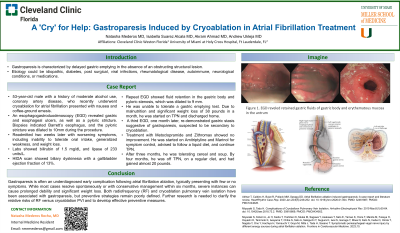Monday Poster Session
Category: Stomach
P3359 - A 'Cry' for Help: Gastroparesis Induced by Cryoablation for Atrial Fibrillation Treatment
Monday, October 28, 2024
10:30 AM - 4:00 PM ET
Location: Exhibit Hall E

Has Audio
.jpg)
Natasha Mederos, MD
University of Miami Miller School of Medicine at Holy Cross Hospital, FL
Presenting Author(s)
Natasha Mederos, MD1, Isabella Suarez Alcala, MD2, Akram Ahmad, MD3, Andrew Ukleja, MD3
1University of Miami Miller School of Medicine at Holy Cross Hospital, Fort Lauderdale, FL; 2Palmetto General Hospital, Hialeah, FL; 3Cleveland Clinic Florida, Weston, FL
Introduction: Gastroparesis is characterized by delayed gastric emptying without an obstructing structural lesion. Etiology could be idiopathic, diabetes, post-surgical, viral infections, rheumatological disease, autoimmune, or medications. We present a case of gastroparesis believed to be caused by peri-esophageal vagal nerve injury during posterior left atrial cryoablation performed to treat atrial fibrillation.
Case Description/Methods: A 53-year-old male who recently underwent cryoablation for atrial fibrillation presented with nausea and coffee-ground emesis 3 days after intervention. An esophagogastroduodenoscopy (EGD) revealed gastric and esophageal ulcers and questionable pyloric narrowing. The pyloric stricture was dilated with a balloon to 10 mm endoscopically with no improvement in symptoms. The patient was readmitted two weeks later with worsening symptoms, including nausea, vomiting, inability to tolerate any oral intake, generalized weakness, and progressive weight loss. Labs showed bilirubin of 1.5 mg/dL and lipase of 233 units/L. A HIDA scan showed gallbladder ejection fraction of 13%. A repeat EGD showed a large amount of fluid retention in the gastric body, and mild pyloric narrowing without gastric ulcers. Attempt of gastric emptying test was unsuccessful due to vomiting. Because of malnutrition and significant weight loss of 40 pounds in 1 month period, parenteral nutrition (PN) was initiated. Since the patient continued to lose weight and refractory vomiting a third EGD, one month later was performed in our center. Re-demonstration of gastric stasis and fluid retention was seen suggestive of gastroparesis, highly suspected to be secondary to cryoablation. Treatment with Metoclopramide and Zithromax showed no improvement. He was started on Amitriptyline and Marinol for symptom control, advised to follow a liquid diet, and continued PN. After three months, he was tolerating cereal and soup. By four months, he was off PN, on a regular diet, and had gained 20 pounds.
Discussion: Gastroparesis is often an underdiagnosed early complication following atrial fibrillation ablation, typically presenting with few or no GI symptoms. While most cases resolve spontaneously, severe instances can cause prolonged debility. Both radiofrequency (RF) and cryoablation pulmonary vein isolation (PVI) have been associated with gastroparesis, but preventive strategies remain poorly defined. Further research is needed to clarify the relative risks of RF versus PVI and to develop effective preventive measures.

Disclosures:
Natasha Mederos, MD1, Isabella Suarez Alcala, MD2, Akram Ahmad, MD3, Andrew Ukleja, MD3. P3359 - A 'Cry' for Help: Gastroparesis Induced by Cryoablation for Atrial Fibrillation Treatment, ACG 2024 Annual Scientific Meeting Abstracts. Philadelphia, PA: American College of Gastroenterology.
1University of Miami Miller School of Medicine at Holy Cross Hospital, Fort Lauderdale, FL; 2Palmetto General Hospital, Hialeah, FL; 3Cleveland Clinic Florida, Weston, FL
Introduction: Gastroparesis is characterized by delayed gastric emptying without an obstructing structural lesion. Etiology could be idiopathic, diabetes, post-surgical, viral infections, rheumatological disease, autoimmune, or medications. We present a case of gastroparesis believed to be caused by peri-esophageal vagal nerve injury during posterior left atrial cryoablation performed to treat atrial fibrillation.
Case Description/Methods: A 53-year-old male who recently underwent cryoablation for atrial fibrillation presented with nausea and coffee-ground emesis 3 days after intervention. An esophagogastroduodenoscopy (EGD) revealed gastric and esophageal ulcers and questionable pyloric narrowing. The pyloric stricture was dilated with a balloon to 10 mm endoscopically with no improvement in symptoms. The patient was readmitted two weeks later with worsening symptoms, including nausea, vomiting, inability to tolerate any oral intake, generalized weakness, and progressive weight loss. Labs showed bilirubin of 1.5 mg/dL and lipase of 233 units/L. A HIDA scan showed gallbladder ejection fraction of 13%. A repeat EGD showed a large amount of fluid retention in the gastric body, and mild pyloric narrowing without gastric ulcers. Attempt of gastric emptying test was unsuccessful due to vomiting. Because of malnutrition and significant weight loss of 40 pounds in 1 month period, parenteral nutrition (PN) was initiated. Since the patient continued to lose weight and refractory vomiting a third EGD, one month later was performed in our center. Re-demonstration of gastric stasis and fluid retention was seen suggestive of gastroparesis, highly suspected to be secondary to cryoablation. Treatment with Metoclopramide and Zithromax showed no improvement. He was started on Amitriptyline and Marinol for symptom control, advised to follow a liquid diet, and continued PN. After three months, he was tolerating cereal and soup. By four months, he was off PN, on a regular diet, and had gained 20 pounds.
Discussion: Gastroparesis is often an underdiagnosed early complication following atrial fibrillation ablation, typically presenting with few or no GI symptoms. While most cases resolve spontaneously, severe instances can cause prolonged debility. Both radiofrequency (RF) and cryoablation pulmonary vein isolation (PVI) have been associated with gastroparesis, but preventive strategies remain poorly defined. Further research is needed to clarify the relative risks of RF versus PVI and to develop effective preventive measures.

Figure: Figure 1
Disclosures:
Natasha Mederos indicated no relevant financial relationships.
Isabella Suarez Alcala indicated no relevant financial relationships.
Akram Ahmad indicated no relevant financial relationships.
Andrew Ukleja indicated no relevant financial relationships.
Natasha Mederos, MD1, Isabella Suarez Alcala, MD2, Akram Ahmad, MD3, Andrew Ukleja, MD3. P3359 - A 'Cry' for Help: Gastroparesis Induced by Cryoablation for Atrial Fibrillation Treatment, ACG 2024 Annual Scientific Meeting Abstracts. Philadelphia, PA: American College of Gastroenterology.
